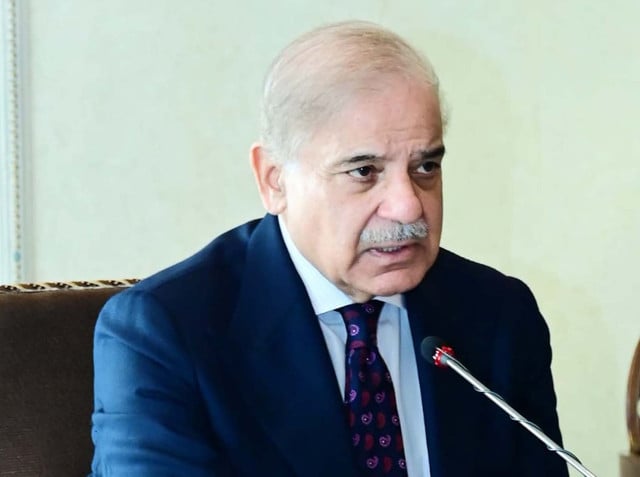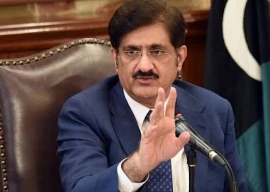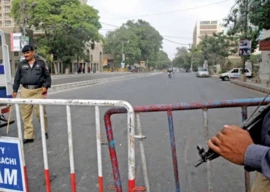
Prime Minister Shehbaz Sharif on Thursday took major decisions to safeguard his government's financial integrity and ensure the bureaucracy does not bypass his appointed deputy ministers in economic policy matters.
PM Sharif issued separate instructions to notify a new joint inquiry team to analyse rising tax fraud cases and to direct federal secretaries to respect his nominated ministers of state, according to these instructions.
The prime minister constituted a joint inquiry team of intelligence agencies and field experts to analyse the reasons behind the growing number of sales tax frauds and to provide actionable recommendations, according to the instructions.
Separately, the Cabinet Division issued directives to all federal secretaries that the minister of state "should be consulted in cases to be submitted for consideration of the prime minister or the federal cabinet." The instructions were issued on behalf of the PM after Minister of State for Finance Ali Pervaiz Malik complained that he was being bypassed in important matters by the Ministry of Finance.
"The prime minister has been pleased to direct that in ministries where ministers of state have been appointed in addition to federal ministers-in-charge, the ministers of state should also be consulted in cases to be submitted for consideration of the prime minister or the federal cabinet," stated the Cabinet Division.
To ensure impartiality, the prime minister appointed Petroleum Minister Dr Musadiq Malik as the convener of the joint inquiry committee. Sharif excluded representatives from the finance and revenue ministries, appointing only one representative from the Intelligence & Investigation wing of the Federal Board of Revenue (FBR). Malik is known for confronting vested interests.
According to the prime minister's office, the inquiry team has been constituted with immediate effect and will submit its report within one month.
Malik will serve as chairman of the team. Members include Bilal Azhar Kayani, a PML-N Member of the National Assembly; Tanvir Akhtar Malik, a former member of the FBR; Ghazi Akhtar Khan, a chartered accountant who contributed to the FBR's transformation plan; and Dr Fareed Zafar. Representatives from the Intelligence Bureau, the Federal Investigation Agency, the Financial Monitoring Unit, and FBR's Intelligence & Investigation wing, including Director Amir Abbas Khan, are also part of the team.
The inquiry team will examine Intelligence Bureau reports on sales tax fraud cases and analyse financial and accounting transactions, focusing on the collusion between public officials and PRAL employees with perpetrators and abettors of sales tax fraud.
Last month, the PM rewarded an FBR officer with Rs5 million for preventing a Rs292 billion tax fraud.
In October, the FBR announced the arrests of at least five individuals in tax fraud cases. Among those apprehended were four Chief Financial Officers (CFOs) accused of orchestrating complex schemes to evade tax liabilities, along with a notorious fraudster.
In Hyderabad, officials arrested the CFO and Purchase Officer of a Lahore-based battery manufacturer for allegedly claiming fake input tax on lead. An FIR was lodged against the company's executives on charges of abetment and connivance in sales tax evasion.
In Faisalabad, intelligence-based operations led to the arrests of CFOs from two sister concerns and a major textile unit for their involvement in claiming fake input tax on coal. This fraudulent activity, led by a gang of tax evaders, caused revenue losses amounting to hundreds of millions of PKR.
In an intriguing reference, the inquiry team has been tasked to "ascertain the Federal Tax Ombudsman (FTO)'s role and its decisions impacting the legal proceedings of tax fraud cases, as well as its press conferences and media talks." The FTO, a constitutionally separate entity, is not subject to government influence.
Last month, the FTO's legal advisor alleged during a press conference that attempts were made, with the collusion of PRAL and FBR officers, to execute approximately Rs528 billion in tax fraud. Fraudsters allegedly filed bogus transactions worth Rs1.6 trillion in iron and steel scrap sales, creating a tax liability of Rs528 billion. These fictitious transactions were routed through various accounts, with Rs81.4 billion traced to an account linked to a retired armed forces member. Ultimately, these schemes benefited manufacturers in Lahore and Faisalabad.
The FTO's legal advisor also revealed that taxpayer complaints against the FBR filed with the FTO increased by 67% in 2024 compared to the previous year. During the first 10 months of 2024, the FTO Secretariat received 10,515 complaints against the FBR.



1727142053-0/Jacob-Erodi-(3)1727142053-0-165x106.webp)



1736498386-0/Express-Tribune---News-Desk-(6)1736498386-0-270x192.webp)
















COMMENTS
Comments are moderated and generally will be posted if they are on-topic and not abusive.
For more information, please see our Comments FAQ